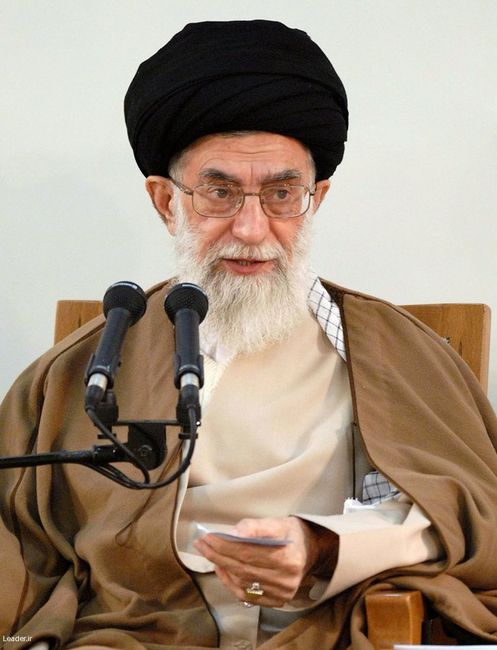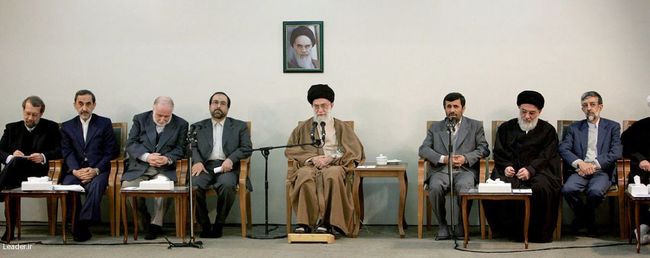Islamic Revolution Leader Ayatollah Sayed Ali Khamenei said Saturday that any society would breathe in the atmosphere which its own culture provides and for the same reason the authorities must tend to culture as the track to reach the Iranian nation's milestone of developing a vibrant society which pursues justice, faith, and sacrifice.
Ayatollah Khamenei was speaking to members of the High Council of the Cultural Revolution.
"Culture, besides its impact on individual and social behavior, would influence the state decision making as well and for that reason it must receive due touches," the IR Leader said.
Ayatollah Khamenei urged the audience to refine their subjective and theoretical discussions in favor of more practical approaches and try to identify the nature and roots of cultural problems and fix them taking into account the model conditions sought after by the Muslim, revolutionary Iranian nation.
"The High Council of Cultural Revolution is expected to provide the opportunity to further social justice, social behavior and social faith," the IR Leader directed.
Ayatollah Khamenei then identified a range of cultural targets to be promoted by the council in the society, including an innovative, work-loving mood, individual and national self-confidence, proper pattern of consumption, use of domestic goods, pursuit of an architecture inspired by Islamic, Iranian and revolutionary values and finally a social risk-taking mood.
"The society already enjoys the necessary conditions to achieve the milestones however in order for them to be realized it must be culturally engineered through further planning and efforts," the IR Leader recommended, noting that the issue has yet to be paid adequate heed.
Ayatollah Khamenei thanked the council members, especially the President and the Secretary of the council for their decisive undertaking and described the council as a convention of theoreticians and authorities whose special make-up would give it the authority to adopt necessary measures and carry them out.
"The essential make-up is expected to systematically advance the country and society towards the aspirations on the ground," the IR Leader said.
Ayatollah Khamenei criticized the idea that the council's decision runs counter to the authority of other state bodies, adding that the council actually organizes and streamlines the policy of all governmental bodies on a higher outlook and through an objective and at the same time aspirational approach.
The Islamic Revolution Leader considered the ratifications of the council as binding for all governmental bodies especially taking its sensitive position into account.
"As the Imam the departed directed, the ratifications of the High Council of the Cultural Revolution are binding," Ayatollah Khamenei said, adding that a clear-cut mechanism must be developed to carry out the undertaking.
Ayatollah Khamenei urged the council members to render more expertise into its decision making by sharing the elite views in Howzeh (schools of Islamic studies) and universities.
The IR Leader also urged the audience to set up necessary plans to materialize the targets which was discussed in the meeting.
Ayatollah Khamenei was speaking to members of the High Council of the Cultural Revolution.
"Culture, besides its impact on individual and social behavior, would influence the state decision making as well and for that reason it must receive due touches," the IR Leader said.
Ayatollah Khamenei urged the audience to refine their subjective and theoretical discussions in favor of more practical approaches and try to identify the nature and roots of cultural problems and fix them taking into account the model conditions sought after by the Muslim, revolutionary Iranian nation.
"The High Council of Cultural Revolution is expected to provide the opportunity to further social justice, social behavior and social faith," the IR Leader directed.
Ayatollah Khamenei then identified a range of cultural targets to be promoted by the council in the society, including an innovative, work-loving mood, individual and national self-confidence, proper pattern of consumption, use of domestic goods, pursuit of an architecture inspired by Islamic, Iranian and revolutionary values and finally a social risk-taking mood.
"The society already enjoys the necessary conditions to achieve the milestones however in order for them to be realized it must be culturally engineered through further planning and efforts," the IR Leader recommended, noting that the issue has yet to be paid adequate heed.
Ayatollah Khamenei thanked the council members, especially the President and the Secretary of the council for their decisive undertaking and described the council as a convention of theoreticians and authorities whose special make-up would give it the authority to adopt necessary measures and carry them out.
"The essential make-up is expected to systematically advance the country and society towards the aspirations on the ground," the IR Leader said.
Ayatollah Khamenei criticized the idea that the council's decision runs counter to the authority of other state bodies, adding that the council actually organizes and streamlines the policy of all governmental bodies on a higher outlook and through an objective and at the same time aspirational approach.
The Islamic Revolution Leader considered the ratifications of the council as binding for all governmental bodies especially taking its sensitive position into account.
"As the Imam the departed directed, the ratifications of the High Council of the Cultural Revolution are binding," Ayatollah Khamenei said, adding that a clear-cut mechanism must be developed to carry out the undertaking.
Ayatollah Khamenei urged the council members to render more expertise into its decision making by sharing the elite views in Howzeh (schools of Islamic studies) and universities.
The IR Leader also urged the audience to set up necessary plans to materialize the targets which was discussed in the meeting.



